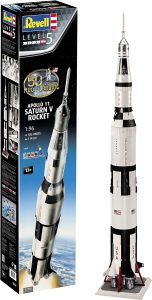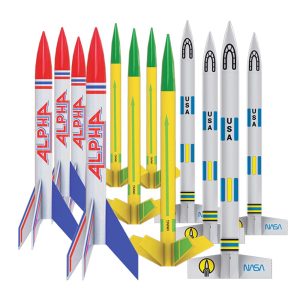Imagine blasting off into the world of model rockets, where creativity meets science and adventure knows no bounds! Welcome to the ultimate guide for kids and young enthusiasts, where we'll explore the fascinating realm of model rockets and ignite your passion for space exploration.
Quick Links to Useful Sections
What Are Model Rockets?
Model rockets are scaled-down versions of real rockets, designed for recreational and educational purposes. They're an amazing way to learn about aerospace engineering, physics, and mathematics while having a blast (literally!). From simple, DIY kits to complex, high-performance models, there's a world of possibilities waiting to be explored.
Model rockets can be powered by various propulsion systems, including solid-fuel motors, liquid-fuel engines, and even hybrid systems. They can soar to incredible heights, reaching speeds of up to several hundred miles per hour and altitudes of over 1,000 feet.
The Science Behind Model Rockets
Building and launching model rockets is an excellent way to learn about fundamental scientific concepts, such as:
- Aerodynamics: The study of air resistance and how it affects the rocket's flight.
- Thermodynamics: The relationship between heat, energy, and the rocket's propulsion system.
- Newton's Laws: Understanding how forces, motion, and gravity impact the rocket's trajectory.
- Materials Science: Exploring the properties and applications of various materials used in model rocket construction.
By experimenting with different designs, materials, and propulsion systems, you'll develop a deeper understanding of these concepts and how they apply to real-world problems.
Looking For The Best Model Rocket Kits? You'll Love These:
Getting Started with Model Rockets
Ready to blast off into the world of model rockets? Here's a step-by-step guide to help you get started:
- Choose a Kit: Select a model rocket kit suitable for your skill level and interests. Beginners can start with simple, pre-assembled kits, while experienced enthusiasts can opt for more complex, custom designs.
- Understand Safety Precautions: Always follow safety guidelines and precautions when building, launching, and recovering model rockets.
- Assemble and launch: Follow the kit's instructions to assemble the rocket, and then launch it in an open, safe area.
- Track and Analyze: Use tracking devices and software to monitor the rocket's flight, analyze its performance, and refine your designs.
Remember to always follow safety guidelines and local regulations when launching model rockets.
model rocket Design and customization
One of the most exciting aspects of model rocketry is designing and customizing your own creations. Here are some tips to get you started:
- Choose a Theme: Select a theme or inspiration for your model rocket, such as a real spacecraft, a fictional vehicle, or a unique design.
- Select Materials: Experiment with different materials, such as balsa wood, plastic, or carbon fiber, to create a durable and lightweight structure.
- Design for Aerodynamics: Use computer-aided design (CAD) software or simulations to optimize your rocket's shape and aerodynamics.
- Add Custom Features: Incorporate unique features, such as LED lights, cameras, or custom paint jobs, to make your model rocket truly stand out.
The possibilities are endless, and the most important thing is to have fun and be creative!
Model Rocket Communities and Resources
Joining a model rocket community or accessing online resources can help you connect with like-minded enthusiasts, learn new skills, and stay up-to-date with the latest trends and technologies.
- National Association of Rocketry (NAR): A non-profit organization dedicated to promoting model rocketry and providing resources for enthusiasts.
- Model Rocketry Forums: Online forums and discussion groups where you can connect with other enthusiasts, ask questions, and share knowledge.
- Tutorials and Guides: Websites and YouTube channels offering tutorials, guides, and tips on model rocket design, construction, and launching.
- Local Clubs and Meetups: Join local model rocket clubs or attend meetups to connect with fellow enthusiasts and participate in group launches.
By tapping into these resources, you'll become part of a vibrant community that shares your passion for model rockets.
Model Rockets and STEM Education
Model rockets offer a unique opportunity to integrate STEM education (science, technology, engineering, and mathematics) with hands-on, project-based learning.
- Science Fair Projects: Use model rockets as a platform for science fair projects, exploring topics like aerodynamics, propulsion systems, and materials science.
- STEM Competitions: Participate in STEM competitions, such as the Team America Rocketry Challenge (TARC), to design, build, and launch model rockets that meet specific challenges.
- Classroom Integration: Incorporate model rockets into classroom curricula, using them to teach concepts like physics, mathematics, and engineering design.
By leveraging model rockets in STEM education, you'll inspire the next generation of innovators, engineers, and space explorers.
Frequently Asked Questions
Here are some frequently asked questions about model rockets:
1. What is the safest way to launch a model rocket?
Always follow safety guidelines and precautions, including launching in an open area, wearing protective gear, and ensuring a safe distance from spectators.
2. How high can model rockets fly?
Model rockets can reach altitudes of over 1,000 feet, depending on the design, propulsion system, and weather conditions.
3. Can I build a model rocket that looks like a real spacecraft?
Yes! You can design and build a model rocket that resembles a real spacecraft, using reference images, CAD software, and creative materials.
4. Are model rockets expensive?
Model rocket kits and materials can vary in price, but you can start with affordable options and upgrade as you gain experience and skills.
5. Can I launch model rockets in my backyard?
Check local regulations and ensure that your backyard is a safe and suitable location for launching model rockets.
Resources and Community Support: Your Next Steps
Now that you've started your model rocket journey, here are some resources to help you continue exploring and learning:
- National Association of Rocketry (NAR): A non-profit organization dedicated to promoting model rocketry and providing resources for enthusiasts.
- Model Rocketry Forums: Online forums and discussion groups where you can connect with other enthusiasts, ask questions, and share knowledge.
- Tutorials and Guides: Websites and YouTube channels offering tutorials, guides, and tips on model rocket design, construction, and launching.
- Local Clubs and Meetups: Join local model rocket clubs or attend meetups to connect with fellow enthusiasts and participate in group launches.
Remember, the model rocket community is always eager to help and support newcomers. Don't hesitate to reach out, ask questions, and share your experiences.
Looking For The Best Model Rocket Kits? You'll Love These:
Useful Interruption: Dive deeper into the world of Model Rockets with our most popular sections. If there is anything you think is missing or anything you would love for us to write about, just give us a shout.
- Getting Started & Basics With Model Rockets
- Model Rocket Design, Build & Customization
- Model Rocket Propulsion & Engine Technology
- Model Rocket Launch Techniques & Recovery
- Model Rocket Advanced Rocketry & Innovations
- Model Rocket DIY and Customization
- Model Rocket Equipment Reviews & Digital Tools
- Community, Competitions & Education
- Model Rocket Troubleshooting & FAQs
- Model Rocket Bonus/Seasonal & Niche Topics
A group of model rocket enthusiasts gathered at a field for their weekly launch event. Among them was Dave, a seasoned builder known for pushing the limits of hobby rocketry. This time, he had outdone himself.
“Ladies and gentlemen,” Dave announced, dramatically pulling a cloth off his latest creation, “I present to you: The Kraken!”
The crowd gasped. This wasn’t just a model rocket, it was a monster. The thing stood 8 feet tall, had six clustered engines, and was covered in enough duct tape to qualify as a classified aerospace project.
“Dave,” muttered Steve, the cautious safety officer, “Have you, uh… done the math on this?”
“Math?” Dave scoffed. “I built it in my garage at 3 a.m. with parts from eBay. This is an art piece, Steve.”
The countdown began.
5…
4…
3…
2…
1…
The engines ignited with a BOOM, and The Kraken shot up… kind of. It immediately did a violent barrel roll, narrowly missing the spectators before skyrocketing at an angle that could only be described as “legally questionable.”
The crowd collectively ducked as The Kraken flew straight over the adjacent cornfield, where Old Man Jenkins, the grumpiest farmer in town, was minding his business.
KABOOM!
The rocket disappeared behind the barn. A moment later, a flaming piece of Estes igniter wire landed at Steve’s feet. The silence was deafening.
And then, an unmistakable sound echoed across the field.
Jenkins’ shotgun being cocked.
“DAVE!!!” Steve shouted. “RUN.”
And that was the day Dave invented the first-ever biologically powered rocket booster: pure adrenaline.
To this day, nobody knows where The Kraken landed, but legend has it, it still haunts the skies, terrifying unsuspecting drones and low-flying birds.















